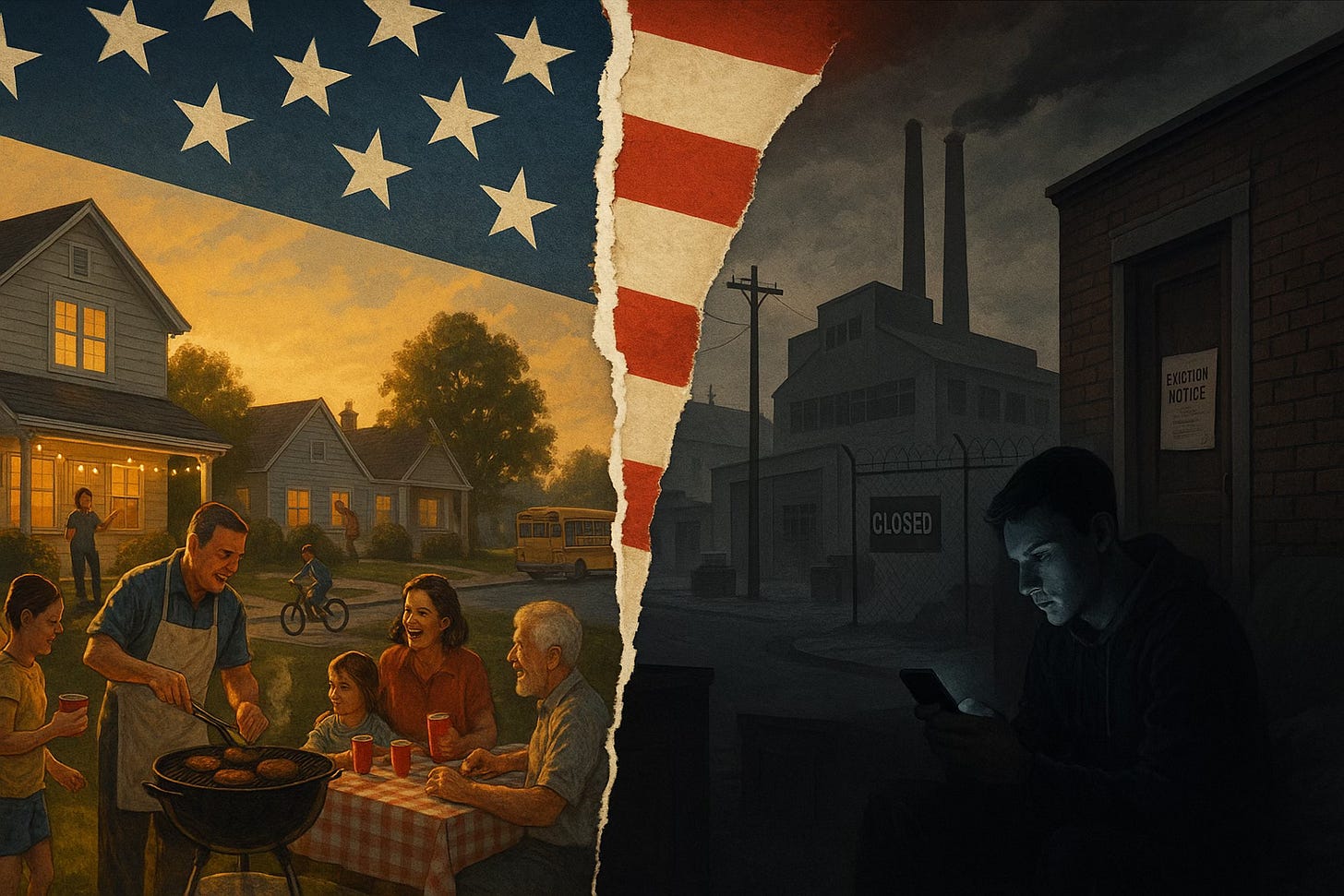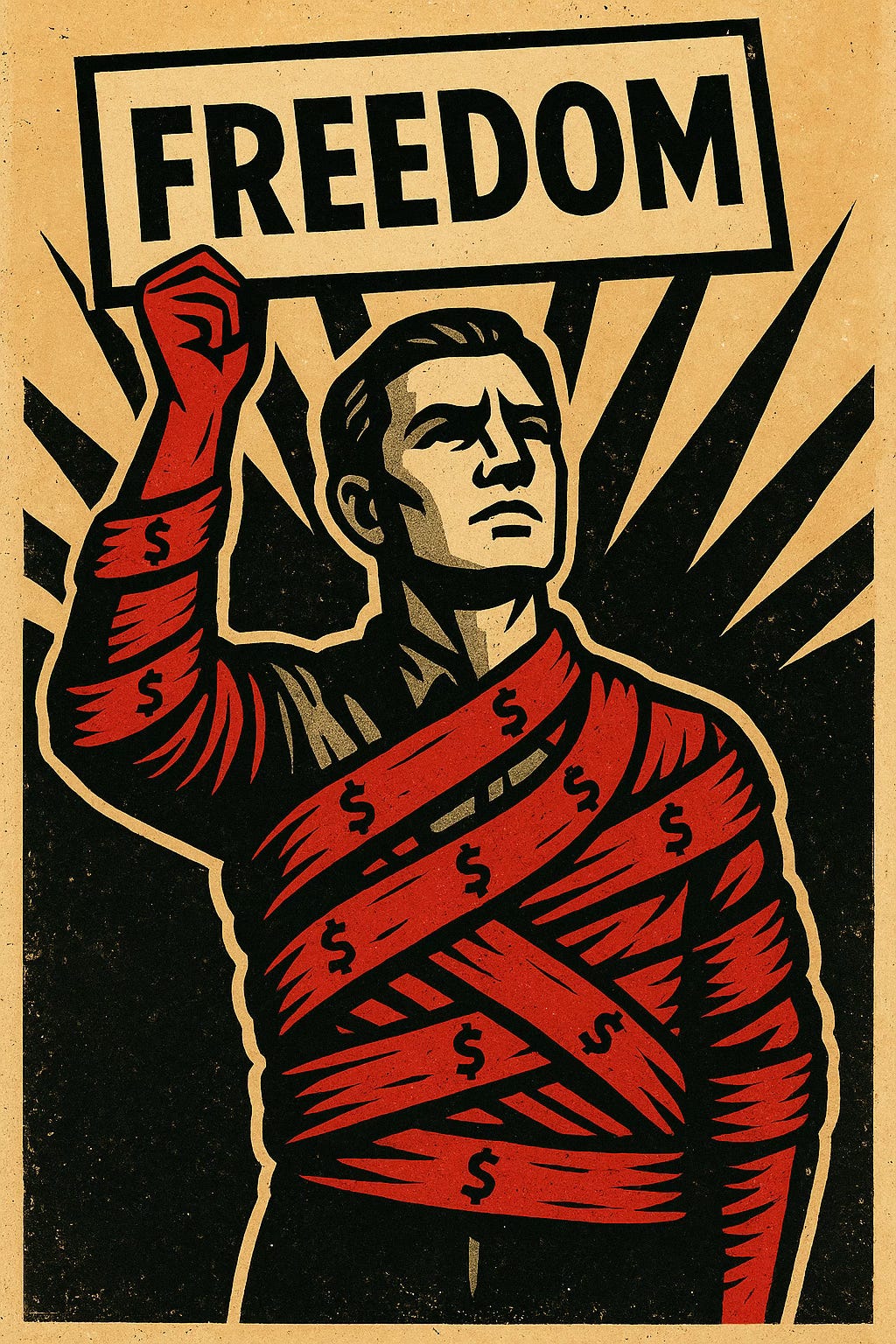The Individual Liberty Con: How Elites Use Freedom to Undermine Collective Power
Exposing the myth of individual liberty and reclaiming the power of collective care.
Opinion by Friendo Media Editorial Staff
I was raised by Silent Generation grandparents in a small suburban town north of Los Angeles. We were standard middle class: could afford to take summer vacation road trips, spent time organizing family gatherings, and my grandparents knew everyone. Every time we went out to dinner we would run into someone they knew, someone they grew up with, someone they raised their children around. When my friends' parents needed money for groceries or gas, my grandmother helped them. When someone needed a ride from the airport, we were there to get them. We helped each other because it was the right thing to do. It was the American thing to do. It was the Christian thing to do.
But for years Americans have been sold a new seductive story: that individual liberty is the ultimate expression of our national identity. It’s a narrative that spans both Republican and Democratic rhetoric, echoing across campaign speeches, news stations, and social media pages. But this fixation on personal freedom is not just a cultural myth—it’s a political strategy, carefully crafted to dismantle collective power and keep communities fragmented, disorganized, and dependent on them: The elites.
The right wing has wielded “liberty” as a covert narrative weapon for decades. Whether it's refusing to wear masks during a public health crisis or resisting regulations that protect workers and the environment, conservatives wrap selfishness in the flag and call it freedom. But liberals, too, have quietly advanced a version of this myth, promoting consumer choice, self-optimization, and “lean-in” individualism as substitutes for real systemic change. In both cases, the result is the same: the burden of change is shifted from institutions to individuals, and the structures that could hold power accountable—unions, mutual aid networks, cooperatives, grassroots organizing—are left to wither.
What’s obscured in this obsession with the individual is a deeper truth: liberty without solidarity is a farce. A fraud. A way of taking power away from both you as the individual, as well as the community you are part of.
When the minimum wage hasn’t kept pace with inflation, when 77% of the American population cannot afford a median priced home, and when healthcare remains tethered to employment, it’s not your personal choices that matter. It’s your collective power—or in the American dream scenario – lack of it. By keeping us atomized and scrambling to solve structural problems through personal effort, the political and economic elite - billionaires, corporate lobbyists, and media barons — ensure we stay too distracted, too exhausted, and too divided to organize for real change. They sell us the myth of personal responsibility without giving us any of the power to actually change the system.
We’re told we can vote our way to liberation, but electoral politics have been co-opted by money and managed by a bipartisan elite more interested in maintaining the status quo than disrupting it. Both Republicans and Democrats have gutted social programs, deregulated industries, and bailed out corporations, all while preaching freedom. But freedom for whom? For billionaires to hoard wealth? For corporations to pollute with impunity? For landlords to evict families and banks to foreclose, putting children on the streets? If your freedom depends on someone else's exploitation, it's not freedom—it's theft.
True freedom isn’t the ability to do whatever you want regardless of others—it’s the capacity to live in dignity, to participate meaningfully in your community, and to know that your well-being is intertwined with those around you. That kind of freedom only comes through collective action.
We need to reclaim our communities. Organize with our neighbors. Start food cooperatives. Join or form unions. Support mutual aid groups. Get to know your neighbors and build networks of care that are immune to the whims of Washington or Wall Street. We must stop outsourcing our power to politicians who speak of freedom but legislate subjugation. The only people who will save us are us.
The myth of rugged individualism is designed to keep us isolated and powerless. But every freedom movement in history has begun with people coming together, refusing to face injustice alone. Real change has always come from the bottom up—when ordinary people saw through the con, linked arms across difference, and dared to build a future rooted in collective liberation.
But how do we do it?
How do we fight back against a myth that has shaped so much of our lives? How do we rebuild what was stolen—not through policy memos or viral hashtags, but with our hands, our hearts, and our neighbors? The answer isn’t new. It’s what people have always done in times of crisis, abandonment, or authoritarian drift. We turn to each other.
Start by getting to know your neighbors. Not just waving at them, but really knowing them—what they care about, what keeps them up at night, what they dream of for this block or building. Host a potluck. Make a group chat. Knock on a door and ask, “What do you love about this place?” Because no revolution was ever built without relationships. You can’t organize people you don’t know.
Then map what already exists. In the Black Freedom Struggle, the farmworker movement, and countless others—organizers didn’t start with what was missing, they started with what was possible. What land, skills, knowledge, or space do we already have? What do we actually need? When you identify your community’s strengths and shared struggles, you stop reacting to crisis and start building with intention.
Start mutual aid. Not as charity, but as survival and solidarity. Exchange childcare. Share rides. Stock a free fridge. Use paper sign-ups or group texts—whatever people can access. You don’t have to wait for funding. You just have to be consistent. This is how trust grows. This is how the lie of individual struggle begins to crumble.
Choose an issue that matters—rent hikes, food deserts, dangerous streets—and organize around it. Gather people. Listen. Find the thread that connects everyone, and pull it. Form a crew. Draft a demand. Disrupt the quiet. When people take action together, they feel their power. And that changes everything.
Reclaim space. Whether it’s a vacant lot, a closed school, or a neglected park—take it back. Turn it into a garden, a tool library, a community kitchen. Use it for healing circles, assemblies, or story nights. Physical space gives your organizing roots. Visibility. Permanence.
Support those already doing the work. Don’t reinvent—reinforce. Show up to city council meetings. Volunteer with the local tenant union. Back BIPOC-led groups who’ve been holding it down without fanfare or funding. Pool what you have—time, money, energy—no red tape needed.
Create a way to stay connected. A newsletter, a WhatsApp group, a sidewalk bulletin board. Translate it. Make it accessible. This is your communications infrastructure. Without it, movements scatter. With it, they sing.
Practice radical love. Not the abstract kind—the kitchen-table kind. The “who needs a ride?” kind. The “I see you, I’ve got you, you belong here” kind. Celebrate birthdays. Mourn losses. Make sure the people most often excluded—immigrants, elders, queer and trans folks, disabled neighbors—know this space is for them too. Strategy builds momentum. Love keeps it alive.
Push back on extraction. Teach your neighbors how gentrification works. Show how corporate developers and nonprofits strip wealth from our blocks. Fight for land trusts, tenant rights, budgeting that keeps communities in mind first and foremost. Build what doesn’t exist yet, instead of begging powerful elites to be merciful.
And finally: don’t wait for perfect. Movements are messy. People are complicated. Let them be. Invite everyone in. Share the mic. Trust the process. Organizing is a practice, not a performance. Every freedom struggle in history—from abolition to labor to liberation—grew from small steps, not spotless plans.
A honeybee circling a politician is a nuisance. A swarm is dangerous. Build your swarm now. Before it’s too late.




